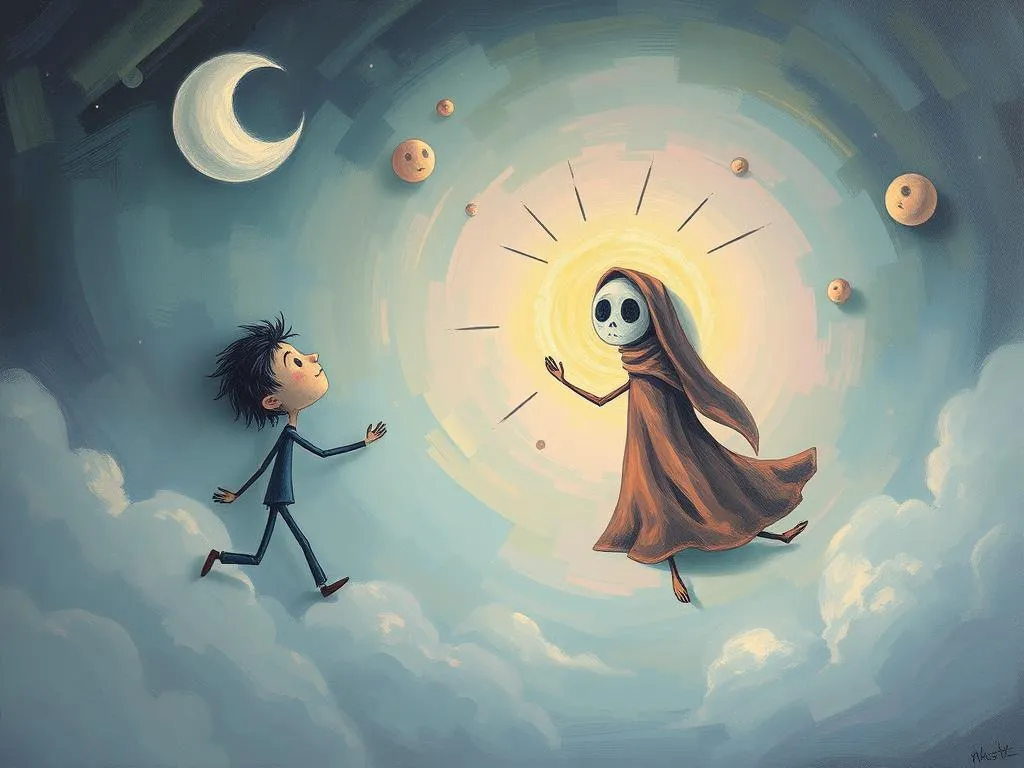
Introduction
Dreams about passing away or death are among the most profound and often unsettling experiences one can encounter during sleep. These dreams evoke a range of emotions, from fear and anxiety to a sense of peace or closure. The relevance of such dreams lies in their ability to touch upon our deepest fears and existential questions, making them a compelling subject for exploration. Many people are intrigued by these dreams because they challenge our understanding of life, mortality, and the subconscious mind. This article will delve into the symbolism and meaning of death dreams, explore key variations of these dreams, and offer insights on connecting them to real-life situations.
Symbolism and Meaning
Dreams featuring passing away often symbolize significant transitions or changes in the dreamer’s life. Death in dreams does not necessarily signify a literal end; instead, it frequently marks the conclusion of one phase and the beginning of another. This can relate to various aspects of life, including relationships, careers, or personal growth.
One of the most common interpretations of death dreams is the fear of change. The unconscious mind may use the motif of death to express the anxiety surrounding transitions—such as moving to a new city, starting a new job, or ending a relationship. In this context, passing away can symbolize the letting go of the old self to embrace new possibilities.
Another perspective considers death dreams as a form of healing. In many cultures, dreams of loved ones who have passed away can signify closure or a message from the deceased. These dreams may provide comfort and reassurance, indicating that the dreamer is processing grief and moving towards acceptance.
Moreover, the symbolism of death can also represent transformation. Just as a caterpillar must undergo a metamorphosis to become a butterfly, death in dreams may symbolize the shedding of old beliefs or behaviors that no longer serve the dreamer. This transformative aspect encourages individuals to reflect on what they need to release to grow and evolve.
Dreams of passing away can also bring forth themes of fear and loss. For some, these dreams might stem from real-life concerns about mortality, whether it be their own or that of someone they love. Such dreams can serve as a reminder to cherish relationships and to confront unresolved feelings about loss.
In summary, the meaning of dreams about passing away is multifaceted, encompassing themes of change, healing, transformation, and fear. Each individual’s interpretation may differ based on personal experiences and feelings towards death and change.
Key Scenarios and Variations
The context of death dreams can greatly influence their interpretation. Different scenarios create unique emotional landscapes that can lead to varying insights. Here are a few common variations:
-
Dreaming of Your Own Death: This scenario often relates to feelings of inadequacy or a desire for change. It can symbolize the end of a particular phase in life, pushing the dreamer to reevaluate their choices and consider new paths. Alternatively, it may reflect a subconscious fear of failure or a warning to address issues that have been ignored.
-
Witnessing the Death of a Loved One: This type of dream can be particularly distressing. It may represent anxiety regarding the wellbeing of that individual or a reflection of the dreamer’s feelings of helplessness. Conversely, it can also symbolize a desire for that person to change or transform, indicating that the dreamer wishes to see a new side of them.
-
Experiencing Death in a Familiar Place: The location of the dream can also provide insights. For instance, dreaming of death in a familiar environment (like home or a workplace) may signify that changes are imminent in one’s daily life. It can also point to unresolved issues tied to that place, urging the dreamer to confront and address them.
-
Death of an Unfamiliar Person: If the dreamer encounters the death of someone they do not know, it can symbolize a fear of the unknown or a significant change that is on the horizon. This could indicate that the dreamer is grappling with fears about the future or their own mortality.
-
Resurrecting the Deceased: Dreams where the deceased return to life can signify hope and renewal. It may point to unresolved feelings about loss and a desire to reconnect with the past. Such dreams often highlight the healing process and the importance of moving forward while still honoring memories.
Each of these variations provides a different lens through which the dreamer can explore their emotions, fears, and hopes. By reflecting on the specific circumstances surrounding their death dreams, individuals can uncover valuable insights into their current life situations.
Real-Life Connections and Takeaways
Connecting death dreams to real-life situations can be a powerful exercise in self-reflection. Understanding the emotions and symbols present in these dreams can help individuals navigate their waking lives with greater awareness. Here are some practical insights to consider:
Firstly, it’s essential to recognize that dreams about passing away are often reflections of inner turmoil or unresolved feelings. Taking the time to journal about these dreams can provide clarity. Writing down one’s feelings and thoughts upon waking may reveal patterns or recurring themes that need attention. This process can aid in identifying personal fears or desires that may be manifesting in daily life.
Secondly, engaging in open conversations about death and change can be liberating. Whether discussing these themes with friends, family, or a therapist, sharing one’s thoughts can help diminish the stigma associated with death. It can also foster a supportive environment where individuals feel safe to express their fears and seek reassurance from others.
Additionally, considering the transformative aspect of death dreams can inspire personal growth. Reflecting on what aspects of life may need to change can encourage proactive decision-making. If a dream highlights feelings of stagnation, it may be time to reassess goals, relationships, or careers to align with one’s true self.
Lastly, practicing mindfulness and self-compassion can help ease the emotional weight of death dreams. Engaging in meditation or relaxation exercises can create a sense of peace and reduce anxiety surrounding change. Understanding that dreams serve as a mirror to the subconscious can empower individuals to embrace their feelings and use them as a catalyst for personal development.
In conclusion, dreams about passing away can be complex and multifaceted, but they offer valuable insights into the dreamer’s psyche. By reflecting on the symbols, scenarios, and emotions present in these dreams, individuals can foster a deeper understanding of themselves and their life journeys. Whether these dreams evoke fear or inspiration, they ultimately serve as a reminder of the inherent changes and transformations that are part of the human experience. Embrace these dreams as opportunities for growth, healing, and self-discovery.







